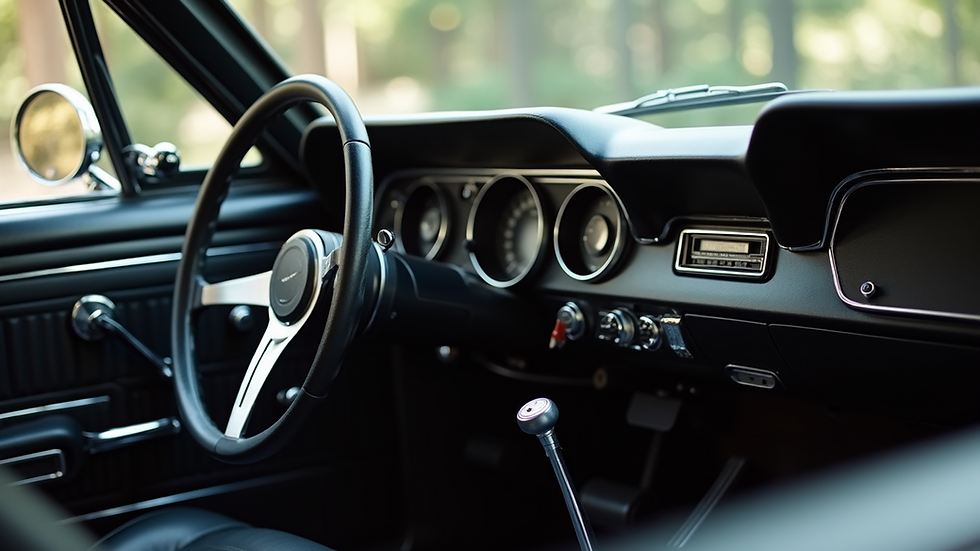Mastering the Art of Classic Car Valuation
- Jesmond John Micallef
- Jul 30, 2025
- 4 min read
Classic vehicles often evoke fond memories and hold significant emotional value for their owners. However, understanding their true monetary worth can be a challenging task. Whether you're buying, selling, or simply admiring classic cars, mastering the art of pricing is essential. This post will guide you through the essential elements of classic vehicle pricing, ensuring you appreciate the nuances of the market.
Understanding Classic Vehicle Pricing
Classic vehicle pricing is influenced by a myriad of factors. These factors include the make and model of the vehicle, its age, condition, and rarity. Not to mention any modifications or restorations that have been carried out.
For instance, a 1969 Ford Mustang in pristine condition will typically fetch a higher price than one that has seen better days. Similarly, rare models like the Ferrari 250 GTO can soar to astronomical values due to their limited production and historical significance.

Many enthusiasts turn to classic car valuation experts to help them understand these factors in greater detail. Professionals utilize various resources and criteria to assess a vehicle's worth accurately.
Key Factors Influencing Classic Car Value
There are several essential factors to consider when determining the value of a classic car:
1. Condition
The condition of a classic car is one of the most crucial elements impacting its value. Cars are commonly categorized into different grades, ranging from mint condition to parts-only.
A vehicle that has been fully restored with original parts will generally command a higher price than one in fair or poor condition. For example, a fully restored 1967 Volkswagen Beetle might sell for upwards of $20,000, while a project car could be listed for $3,000.
2. Rarity
A car’s rarity can significantly enhance its value. Limited production runs, special editions, or unique features can drive prices higher. For instance, the 1937 Talbot-Lago T150-C-SS Teardrop Coupe is not only beautiful but incredibly rare, leading to auction prices exceeding $13 million.
3. Documentation and Provenance
Having detailed documentation of a classic vehicle's history enhances its value. This includes records of previous owners, maintenance logs, and restoration work. A well-documented car provides potential buyers with confidence and adds credibility to the valuation.
A classic car with a famous previous owner may also fetch a higher price due to its historical significance, tapping into the market of collectors willing to pay a premium.

4. Market Trends
Classic car values are subject to change based on broader market trends. Economic factors, consumer preferences, and collector interest can cause prices to rise or fall.
For example, during economic booms, collectors may be willing to invest more in high-value classics, increasing market prices. Conversely, during economic downturns, the market could soften, leading to lower values for certain models.
Resources for Classic Vehicle Valuation
Now that we've covered the key factors influencing classic vehicle pricing, let’s discuss the resources available to help you assess a car's value more accurately.
Price Guides:
Several price guides, such as the NADA Classic Car Guide or Hagerty Valuation Tools, provide estimated values based on various criteria. These guides often evaluate thousands of transactions to deliver comprehensive data.
Auction Results:
Following recent auction results from major auction houses like Barrett-Jackson and RM Sotheby’s can give you real-time information on pricing trends.
Online Forums and Communities:
Engaging with online communities, such as classic car enthusiast forums or social media groups, can offer insights into current values and market trends. Enthusiasts often share their experiences and provide guidance based on real-world sales.
Common Mistakes in Classic Car Valuation
When it comes to classic car pricing, even seasoned collectors can make errors. Here are some common mistakes to avoid:
1. Overvaluing Modifications
While modifications can enhance a vehicle’s appeal, they may not always add value. Many purists prefer original models, which means heavily modified classics may sell for lower prices than anticipated.
2. Relying on Emotional Attachment
While many owners hold sentimental value for their vehicles, it's crucial to separate emotion from economics. A personal connection should not dictate a pricing strategy. Objectivity is key.
3. Ignoring Market Demand
Ignoring current market trends can lead to overpricing or underpricing a classic car. Always stay informed about the market and gauge interest levels.

Working with Professionals in Classic Car Valuation
If you're still uncertain about valuing your classic car, consult with us. As, Expert valuators, we will look at your vehicle's condition, history, and market trends to provide an accurate assessment.
It's essential to choose someone who specializes in classic vehicle valuation, as they will have a deeper understanding of the specific factors that influence these cars’ worth.
Final Thoughts on Classic Vehicle Pricing
Mastering the art of classic vehicle pricing requires time and effort. Understanding various market influences, maintaining objectivity, and utilizing available resources are all integral in determining the right valuation.
By paying attention to the key factors discussed in this post and engaging the right experts, you’ll not just have a better understanding of classic car valuation but also a greater appreciation for these timeless vehicles.
Whether you're buying or selling, being informed and cautious can save you from costly mistakes. As the classic car market continues to evolve, staying updated will ensure you navigate it effectively.
For more information on classic car valuation, you can explore resources such as Waimak Valuations.



Comments